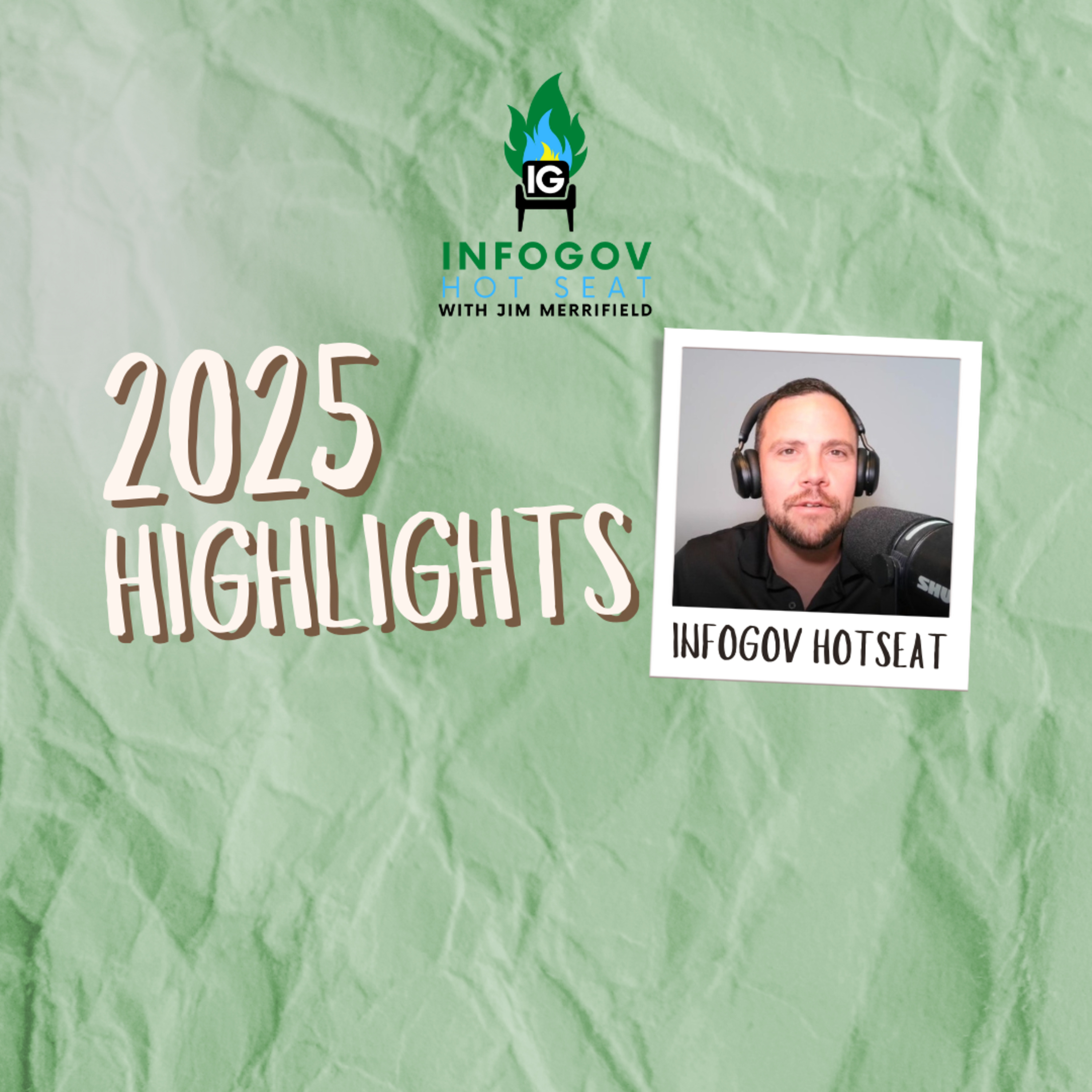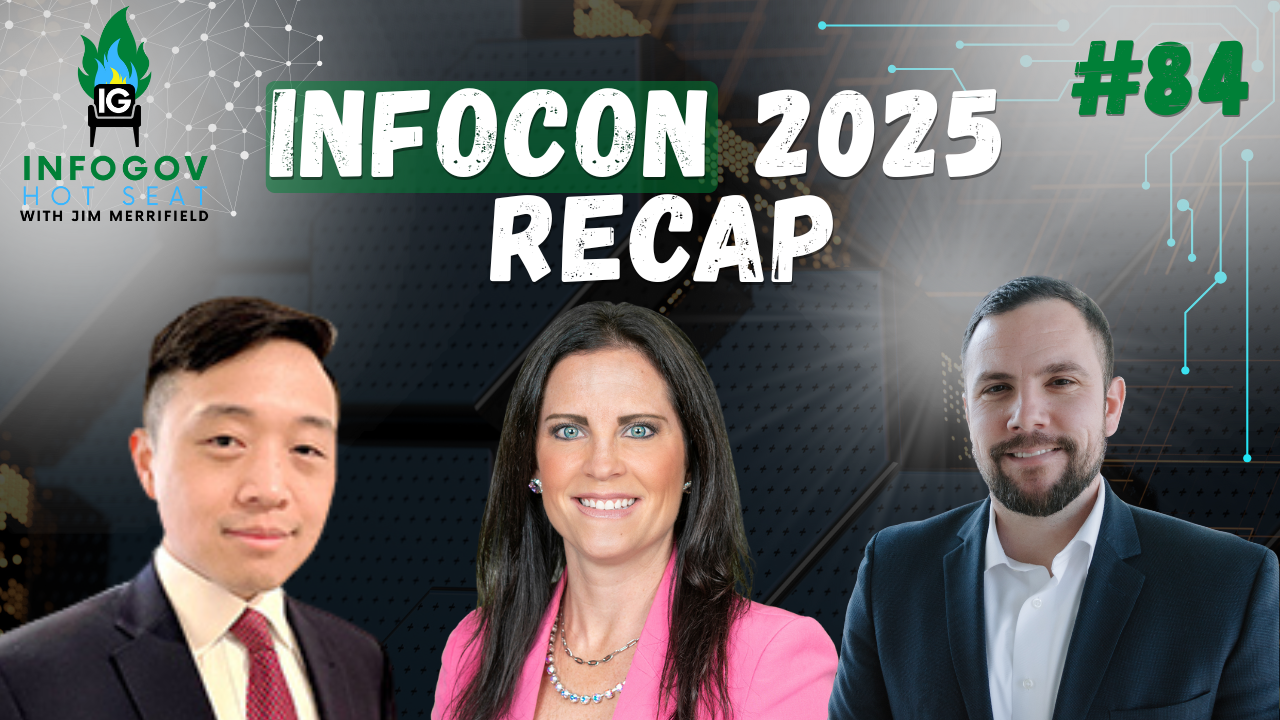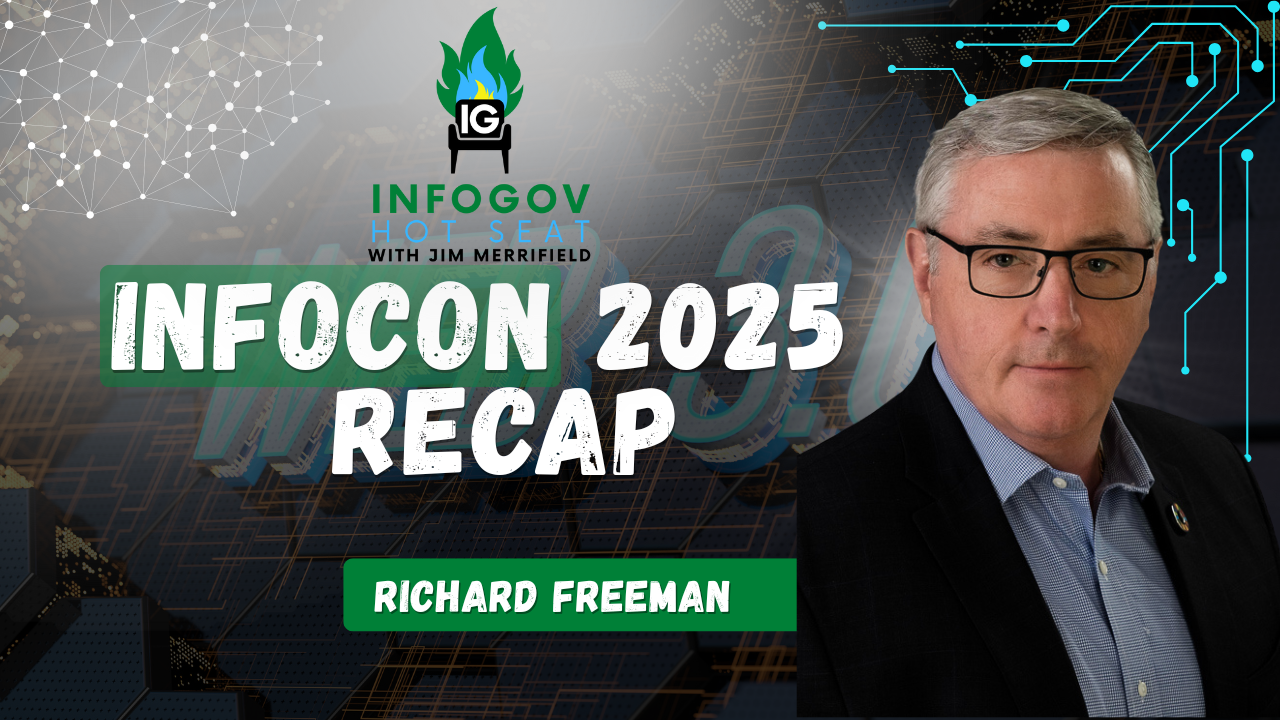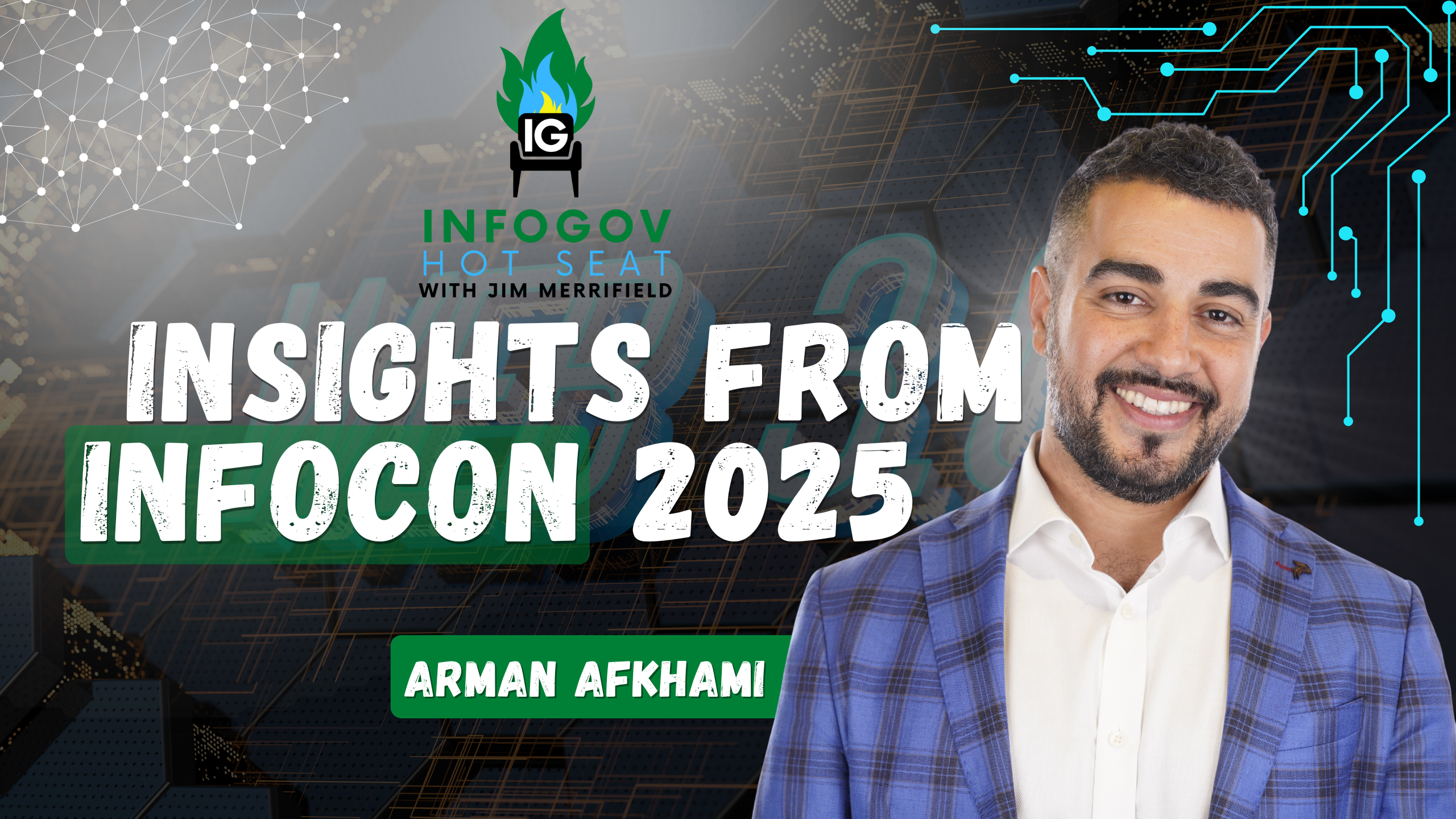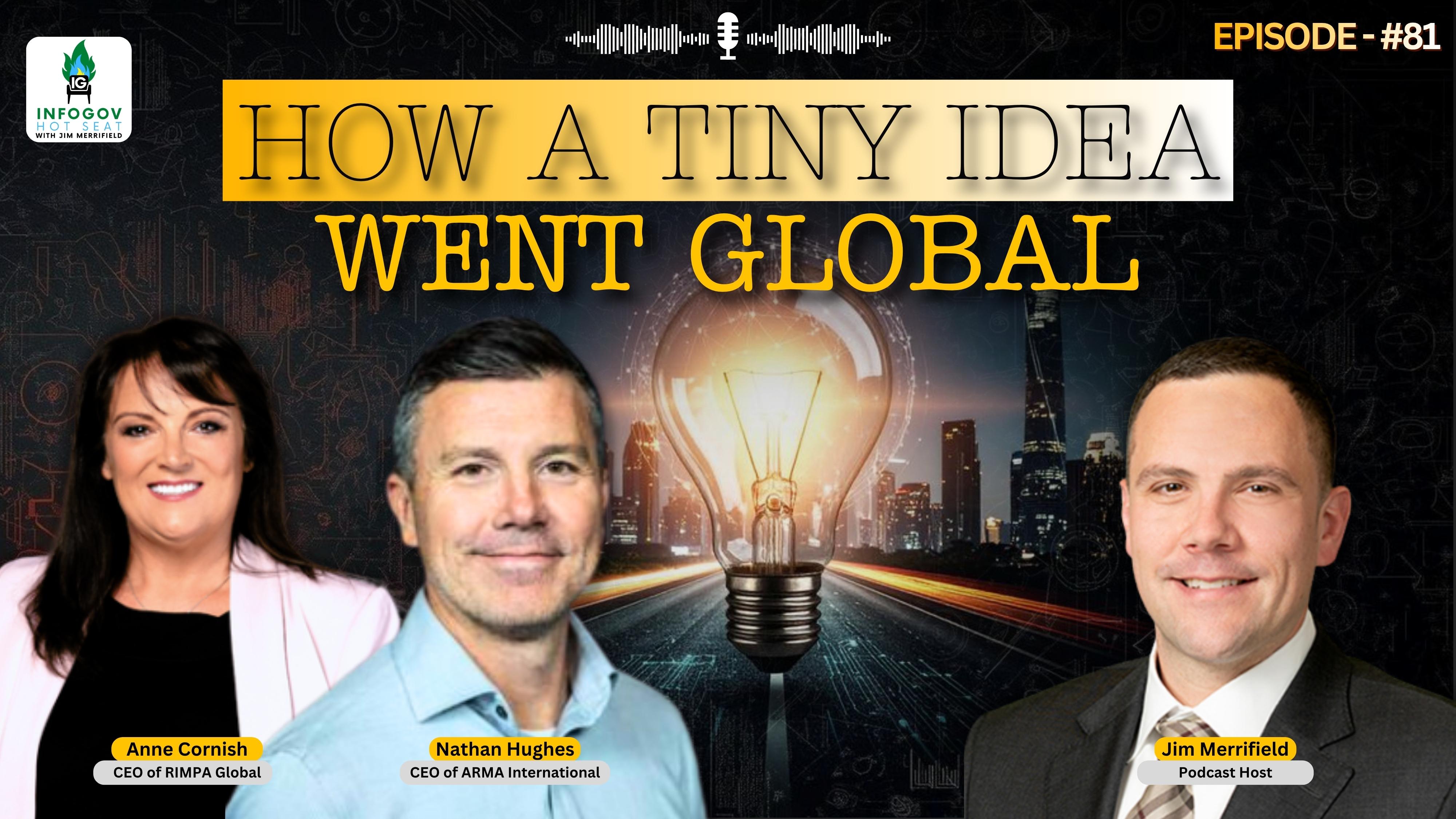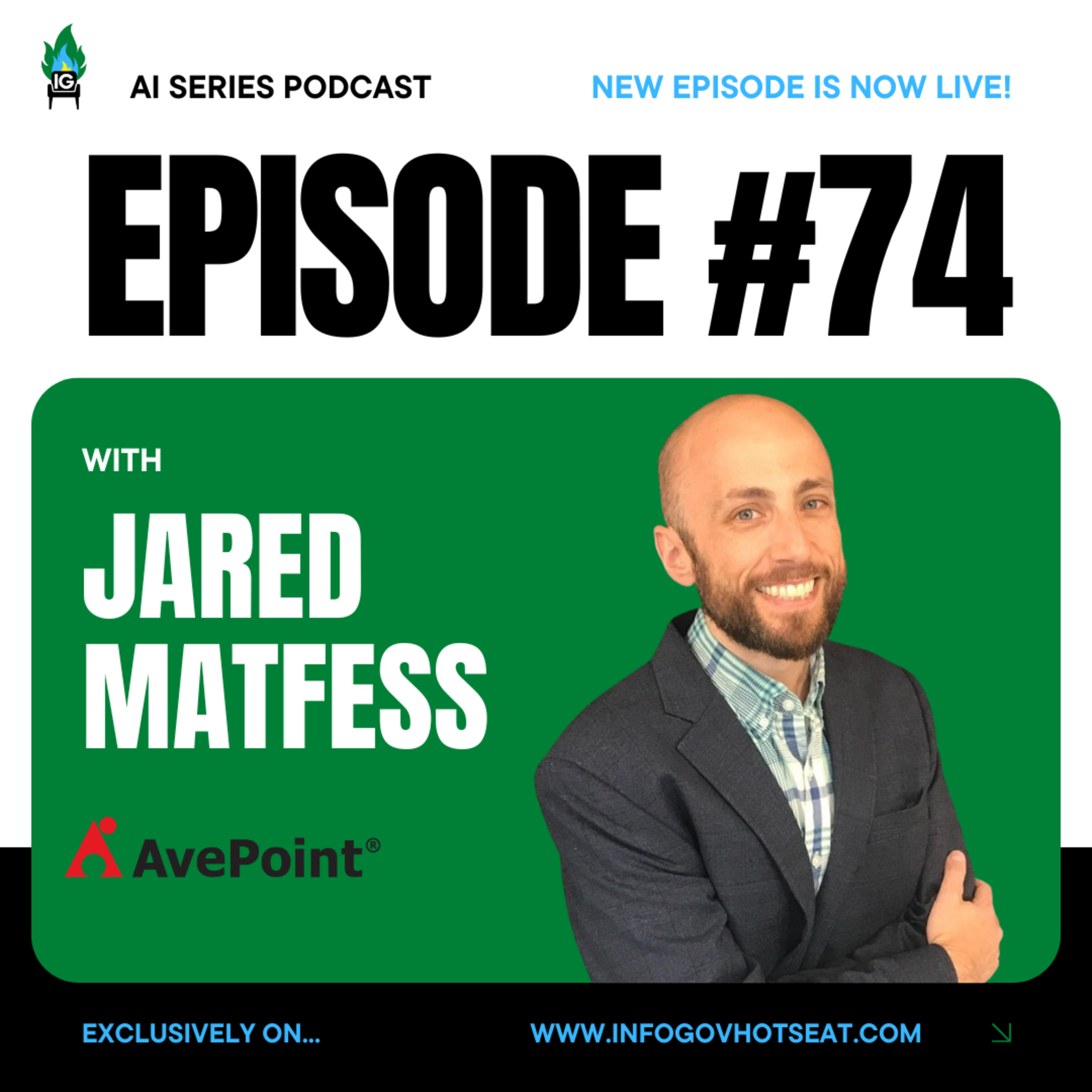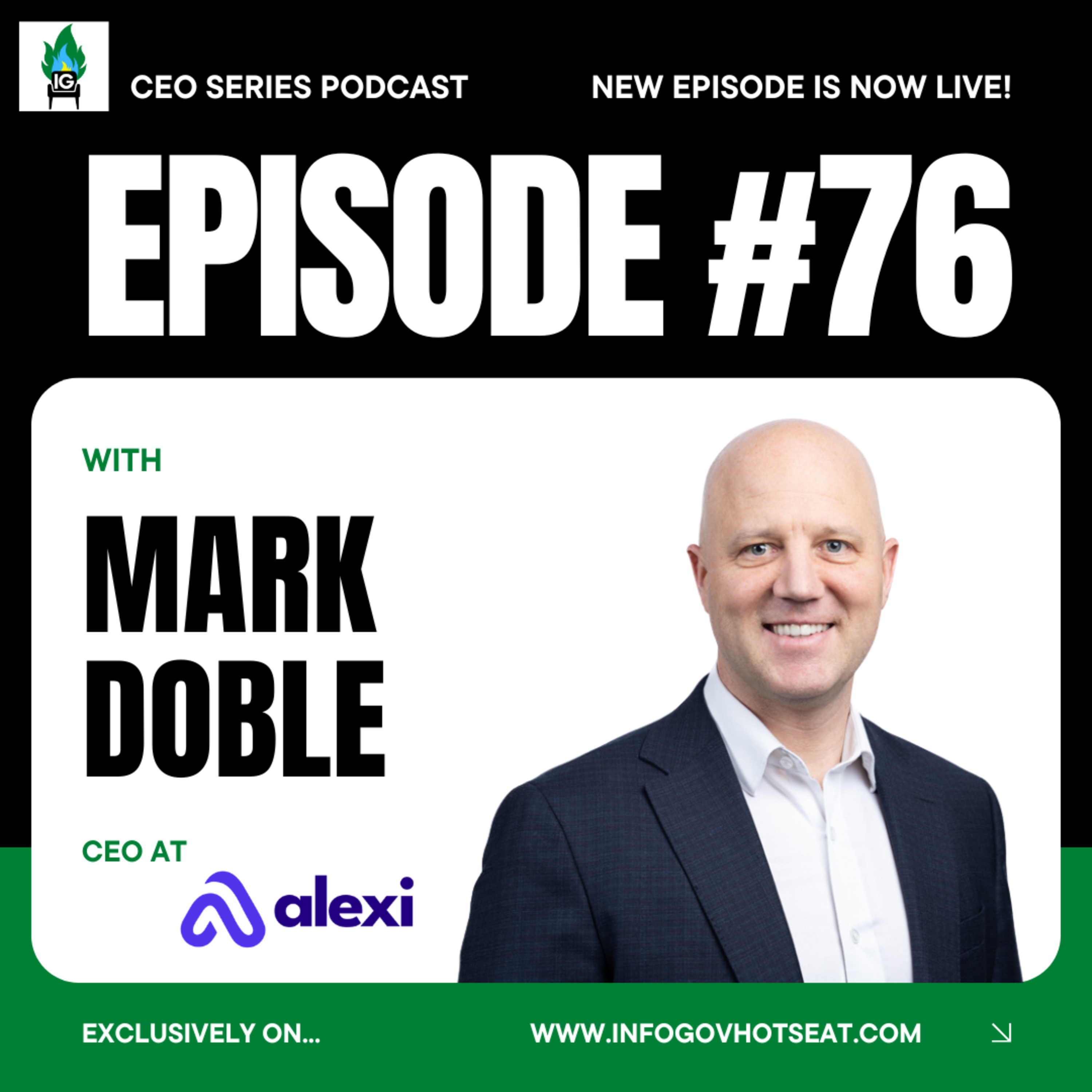IGHS72 - Navigating the Future of Technology with Ravi Malick, SVP & CIO at Box
In this episode of the InfoGov Hot Seat, host Jim Merrifield speaks with Ravi Malick, Global CIO at Box. They discuss the evolving role of IT in governance, the impact of AI on business processes, and the importance of collaboration across departments. Ravi shares insights on how different industries are adopting AI, the necessity for CIOs to engage with governance teams, and the future of workforce management in the age of technology. The conversation also touches on personal interests, including Ravi's passion for baseball and sneakers.
Jim Merrifield (00:01.007)
Well, hello and welcome to the InfoGov Hot Seat. I'm your host, Jim Merrifield and with me today is Ravi Malick Global CIO at Box. Welcome, Ravi.
Ravi Malick (00:10.016)
Hey, thanks, Jim. Appreciate you having me on.
Jim Merrifield (00:12.795)
Yeah, it's a pleasure to have you in the hot Seat. I know we were on a panel back in February, so it's great to connect again. been a few months. I'm sure you've been up to much in conferences and different events and things, and also getting some work done in between.
Ravi Malick (00:15.726)
Yeah.
Ravi Malick (00:28.588)
Yeah, yeah, well, I'm trying to leverage AI as much as possible so I can clone myself so I can do all the things.
Jim Merrifield (00:34.993)
You gotta. Yeah, absolutely. And that's what we're gonna talk about a little later. But before we do, why don't you introduce yourself, your current role, and maybe one fun fact about yourself.
Ravi Malick (00:47.17)
Sure. So again, Ravi Malik, I am the SVP and global CIO at Box. I have been at Box for about four years now. And yeah, my role is, it's actually a little unique, it's twofold. So I do the things that CIOs do, running IT and security and operating the environment, et cetera.
And then I also spent a fair amount of my time externally working with customers, speaking at events, really waving the box flag and getting our message out there and how the company has changed and shifted and how it's matured and what we're doing. so I enjoy that part too. I spent the first half of my career really externally on the business side, consulting.
running sales, marketing, those kinds of things. And then I came to the good side, really embraced my inner technologist that's always been there and have been in IT now for the last almost 16, 17 years. I've always been involved in technology in some way or shape or fashion, but running IT in some shape or form for really like the last almost 15 years.
Jim Merrifield (02:07.249)
Yeah, you got an awesome background. Don't forget the fun fact.
Ravi Malick (02:08.94)
Yeah, fun fact, fun fact. I am a rabid sneaker fan, sneaker head. So I say rabid because I think at some point it got, it went from hobby to just out of control. And, you know, we all have the story. Didn't grow up, you know, kind of squarely middle-class. And, you know, wasn't really able to get all the.
cool shoes that I wanted, the Jordans and whatnot. And so when I was, I think it was around eighth grade, honestly. So was when the Jordan threes came out, which is kind of my grail shoe, if you will. I decided that when I get older, get a little bit of money, I'm to get all the sneakers that I couldn't get.
Jim Merrifield (02:56.178)
awesome good for you so is that your favorite one the like the Jordans favorite brand
Ravi Malick (02:59.746)
Jordan 3s, Jordan 3 white cements, yeah.
Jim Merrifield (03:04.982)
Awesome, so do you wear them when you do your keynotes and you're speaking? So no shoes, it's just sneakers?
Ravi Malick (03:08.526)
I do. Yup. Yeah. Yeah. I usually have a pair of sneakers on.
Jim Merrifield (03:14.939)
Yeah, I refuse to wear dress shoes at conferences. I feel like it's just a no-go.
Ravi Malick (03:19.788)
Yeah, yeah.
Jim Merrifield (03:22.449)
For sure, well, awesome background. Love that you're a sneaker head. You say I think we'd get along. I knew it. Now I know we were on a panel together. You represented Box at Global IG Day in February. I know it's been a while, but we're gonna test your memory a little bit. What were your key takeaways from that session? Not that we're gonna test you or anything.
Ravi Malick (03:41.742)
I'm going to
Ravi Malick (03:48.33)
goodness. You know, I think recalling that conversation, it really boiled down to people and relationships. If I recall, there were a lot of points made about making those connections, getting alignment, understanding the needs on the governance side as well as the business side, figuring out
where that overlap is, how do you implement new technology, new data structures, whatever it may be, enable access to information, but doing it in a way that is safe, that is secure and compliant. And I think it really boiled down to the person to person connection.
just being willing to listen, being willing to understand, and being willing to align and find common ground.
Jim Merrifield (04:52.901)
Yeah, it used to be that the the IG folks were on one side and the IT folks were on the other side. And one really didn't talk to the other. You know, there was maybe projects going on and no one knew what the left or the right was was doing. But it seems like with the emergence of of generate generative AI and these IT agents and things, it's almost you know, you almost like you have to work together. And we're seeing that right across companies.
Ravi Malick (04:58.424)
Yeah.
Ravi Malick (05:20.034)
Yeah. Yeah. I think in today's environment, every company is matrixed in some.
shape or fashion, right? We're always trying to do more with less and less with nothing. And so, you know, the ability to get things done within a company independently is, you know, particularly as a leader is pretty much non-existent, right? You have to work with other teams. You have to get alignment.
And that is, it's just the nature of work today and has been for quite some time. And even before that, right? I mean, at the end of the day, technology is technology, but it doesn't get done without people.
Jim Merrifield (06:07.003)
No, exactly, I couldn't have said it better myself. So let's talk about Box a little bit. I know I've seen, especially because I'm on LinkedIn all day, I do have a day job, but I'm on LinkedIn a lot, and I see Box posting all the time. I even see Aaron posting, and he's putting the AI agents in videos and demos and things like that. It seems like you guys have really went head first into AI and building out these AI agents. Can you talk a little bit about that and what you're doing?
Ravi Malick (06:11.64)
Sure.
Jim Merrifield (06:36.539)
with AI agents and even with your clients.
Ravi Malick (06:39.936)
Yeah, and absolutely, we are all in on this. the point of view that we have is that agents really are the future of the workforce. And where kind of IT, technology, even other areas of the business are going.
And we also believe that content and unstructured data is at the center of that. And this is something that I personally have understood early on that really nothing gets done in terms of work and whatnot within an enterprise without content.
Whether it's the beginning of process, middle of the process, end of a process, Content is involved in some shape or form, whether it's to document a presentation, customer invoice, a contract, R &D information. It is really the heart of the enterprise. And what we're seeing and what we've seen with generative AI is that that has just been accelerated. It's been magnified.
Now with agents, how agents receive that information, understand that information, learn, become smarter, become more independent is all based around content. And the content, which is really the digital memory for an organization, that's exactly what it is. And for generative AI and agents in particular to really...
learn and understand and be smart, to the extent that they can be, it requires tapping into that digital memory.
Jim Merrifield (08:30.545)
Yeah, for sure. Now what industries, I know Box services, industries, very broad industry groups, what industry in particular, is there one that's taking advantage of AI more than the other, like financial or insurance or some other industry?
Ravi Malick (08:50.338)
Yeah, you know, it's interesting because you talk to the kind of the pure technologists and they'll say, AI has been around forever, right? We've been doing AI for a long time, right? Yes, totally understand that, right? But what has occurred in the last two, three years is it's moved up into the stack, right? It's moved into the hands of the consumer, the individual user. It's not limited now to PhDs and folks who really understand neural networks and AI at its core.
I think from an industry standpoint, there are certainly industries that have had a running start at this. Financial services for sure. Where's the money? You need money to invest in this stuff. have the money. So they probably maybe a little bit ahead, certainly have tons of use cases that...
Also other industries and other customers would have as well. But when you think about those industries, compliance workflows, the content that...
exists within the banking industry or financial services industry is extensive. In some cases, it's structured, meaning it has certain formats, right? You can extract metadata, it drives workflows. And so, I think that's an industry where we do see a ton of focus and investment. But other areas, the legal profession, for sure, is an area that has
you know, it started to lean in. I think there was maybe some initial, hesitancy. but I think once people kind of get over the, you know, the fear, uncertainty and doubt and understand that this isn't necessarily something that's going to replace me, but it's actually going to enhance and make me better, and give me maybe scalability, and, know, potentially kind of reshape, you know, the industry, to where, you know, you, you actually can bring more value, faster to clients.
Ravi Malick (10:58.608)
And then, you know, in healthcare, healthcare is another, I think, that is starting to lean in pretty heavily on understanding the patient experience and how agents can help with that and really improve, you know, patient interaction, patient onboarding. But just about every industry, you know, is looking at this, right, experimenting in some way, or form. had a good friend of mine made a pretty provocative statement several months ago, and I'm kind of starting to think it might have been true.
which was there are two types of companies in this space now. Those who are leaning in and AI forward and those who are irrelevant. So, yeah, it is one of those technologies that comes along.
Jim Merrifield (11:37.339)
Thank
Ravi Malick (11:45.13)
and has the ability to really shift and change things. Even more so than when big data came along and analytics was the whole rage. That's kind of table sticks now. I think AI will follow that same pattern, is that five, 10 years from now, you won't experience a company that is not leveraging it in some way, shape, or form. And even more specifically, isn't leveraging agents to augment
scale and speed up their workforce.
Jim Merrifield (12:20.505)
I think everybody has a little bit of FOMO with the adoption of AI, especially at least in legal industry. No one wants to be first, but nobody wants to be last. It's like that middle ground. feel like everybody's in the middle right now. So spot on. So being a CIO yourself with that background in tech, what advice do you have? I know we talked about it a little bit, but
Ravi Malick (12:23.734)
Yeah, there was a bit of that for sure. Yeah.
Yeah.
Ravi Malick (12:34.765)
Yeah.
Yep.
Jim Merrifield (12:47.825)
do you have for maybe CIOs that aren't working as closely with say their governance teams or even their other administrative teams at the moment? What advice would you have for them around this type of technology and the adoption of AI or really any technology in the company?
Ravi Malick (13:08.674)
Yeah, my advice would be to reach out and engage. I very much subscribe to the...
philosophy of the better planning you can do upfront, the faster you can go. So kind of the go slow to go really, really fast. And I think that kind of upfront engagement, understanding, you know, perspective on what are the challenges, what are the risks, addressing those risks, figuring out how mitigate them, aligning on what is an appropriate level of risk, right? Defining those things and having that framework upfront enables you to just to really go execute. All right. And focus on the execution and getting to the finish line.
versus kind of starting and having kind of false starts or pauses because, we forgot to consider X, Y, and Z, right? And we got to go back. We have to reframe, potentially rework. And so my advice is to reach out, to engage. Don't be afraid. One of the things we did at Box very early on was form an AI governance council that was driven by our chief privacy officer.
Leah Perry, amazing, really kind of forward thinking in terms of, hey, look, there's a lot of moving parts here. And I understand we, as a company, as a product company, as a technology company, we want to be able to move fast. We want to be a leader in this space. Let's make sure that we have alignment and understanding as to what the risks are, that we're addressing it, we're acknowledging it. And I think it really has helped us move quickly in a safe and
risk aware manner.
Ravi Malick (14:48.846)
And that's been beneficial. That certainly has been beneficial. And so I think it's, from my perspective, it has been about where is the appropriate level of friction versus just kind of stopping things, Like business enablement and the right level of friction versus business prevention and just stop signs everywhere. It's like going from a
four way intersection that's with stoplights to a roundabout, right? Like that flows differently and is more efficient and there's less friction, but it applies the right amount to make sure that you don't get into accidents and you don't have damage, but it keeps things flowing versus, we're stopped, we're stopped here, it's a traffic jam. So it is a...
I view it as like it's the traffic circle that allows things to flow and coordinate in a logical and safe manner.
Jim Merrifield (15:54.001)
Yeah, I love that illustration. I hate four way intersections, but now I understand, right? The essence of, you know, the importance of creating a council or a steering committee or something, right? To have a vehicle to push these things forward. And yeah, we've done something similar. I've seen, you know, colleagues in the legal industry develop, you know, these tech committees or AI councils, just something that has some leadership, some buy-in from the top and then different.
Ravi Malick (15:57.43)
Ha ha ha ha ha ha!
Yeah.
Ravi Malick (16:06.604)
Yeah.
Jim Merrifield (16:23.473)
representatives from all sorts of administrative departments and even legal field practice groups and things so we can actually collaborate together and push initiatives forward instead of like you're saying hitting the brake all the time running into road work which we have all the time in Connecticut, know in New York, North East.
Ravi Malick (16:43.982)
There was actually a study that traffic circles are materially more safe than four-way.
Jim Merrifield (16:56.941)
interesting. All right. Was that AI generated knowledge or?
Ravi Malick (17:02.934)
No, this was pretty AI. And I'm totally borrowing it from a speaker that I saw who talked about that, right, in the context of leadership, right? How do you think of yourself as a leader? Yeah. No, no, it wasn't a hallucination.
Jim Merrifield (17:07.163)
Yeah.
Jim Merrifield (17:13.873)
So it wasn't hallucinating. awesome. So Robbie, I know we talked about a lot here. I know we could probably go on for a while, but is there anything else that you'd like to share with the audience before we let you go?
Ravi Malick (17:31.234)
No, I'll double down on what we talked about earlier in terms of being all in on AI. This is a time for CIOs, for technology leaders to really lean in to be strategic about
the business and understand, you know, how the how this can shift and change, right? You know our CEO Aaron Levie You'll hear him talk about CIOs potentially becoming the new, you know managers of labor of the workforce when it comes to agents and being able to deploy agents, you know and really Being able to you know drive work and work getting done. And how do you manage those things? Right? You know, yeah, it's a piece of technology but
you still need to do the, you know, apply the same measurements. You still need to apply the same things that you would for any technology. So around security and administration and maintenance and, you know, all of those things, but all at the same time, you have to incorporate the same principles as you would a human workforce, right? You have to measure the outcomes. have to, are they performing well? You know, does it work?
Is it generating the outcomes that you expected? And so it's a really interesting and fun time, I think, for technology leaders. Because this really does have the power to shift, not just the technical environment, right? And how we think about applications, but also how we think about the workforce and the business in terms of scalability and growth.
Jim Merrifield (19:06.447)
Yeah, for sure. I mean, there isn't a dull day in my life these days. You know, which is exciting. I mean, it's, yeah, and I'm fortunate to have a pretty great relationship with our CIO, you know, any technology initiative we kind of push forward together. And, you know, we're definitely grateful, you know, for that as well.
Ravi Malick (19:10.744)
Yeah.
Ravi Malick (19:27.586)
Yeah.
Jim Merrifield (19:30.521)
So I got a question for you, Ravi. So obviously we're getting into the summer, summer months. Anything fun? You gonna do something fun this summer?
Ravi Malick (19:37.518)
man, you know, I was hoping to find a little bit of beach time at some point. But you know, my youngest plays baseball and plays travel baseball. So, you know, I get to go to all the fun and exotic locations, you know, like Atlanta and Florida and Tomball Texas for tournaments. So that's fun. I enjoy it. It's great to be a spectator.
Jim Merrifield (19:50.939)
Nice.
Jim Merrifield (19:58.353)
Good for you.
Ravi Malick (20:06.286)
sit back, watch and cheer. It's a fun time. I do enjoy it. I am also a bit of a baseball junkie. it's fun to see your own kind of start to thrive and do well in that environment.
Jim Merrifield (20:23.985)
Yeah, for sure. What position does he play? Awesome.
Ravi Malick (20:25.966)
He is a pitcher. Primarily a pitcher, plays a little third, but think he's kind of starting to zero in on pitching.
Jim Merrifield (20:34.959)
Alright, is he lefty or righty? man, alright.
Ravi Malick (20:37.958)
He's a righty. He's a righty. I know, you know, I tried to tie his arm behind his back when he was a kid, but his mother had some issues with that. He hits lefty though. He does hit lefty.
Jim Merrifield (20:46.114)
Ugh, yeah.
Yeah, we're going to have to have like a non technology podcast and start talking about baseball because I'm a baseball junkie myself. Now you're probably from from Texas. Are you a you're an Astros fan, right?
Ravi Malick (20:53.439)
Absolutely.
Ravi Malick (21:01.034)
I am not, my son is an Astros fan. I actually am a Yankees fan.
Jim Merrifield (21:06.946)
this is awesome. See, we're going to get along well. So I don't know how you live in Texas being a Yankee fan, but in hiding or something.
Ravi Malick (21:13.486)
I know it's tough. grew up in the mid Atlantic, Northern Virginia, graduated high school in New Jersey. So I've got a Yankees, but I got early on the Yankees. It kind of Yankees and A's. I spent a lot of time on the West Coast as well, which my father was a Dodgers fan. So he was a diehard Brooklyn Dodgers and then LA Dodgers. So for me to be Yankees fan was, he just lamented that all day long. you gotta love the pinstripes.
Jim Merrifield (21:33.563)
Alright.
Ravi Malick (21:43.55)
Something about the Pinstripes. I know, I know, that's a, you know, got to evolve. You got to change with the times.
Jim Merrifield (21:44.029)
you got to. There is. And now they can grow beards, you know?
Jim Merrifield (21:53.339)
That's right. That's right. So we'll try to weave this into a presentation or something at some point. And we could figure out how to tie technology, governance, and baseball.
Ravi Malick (21:57.366)
Hahaha!
I'm sure. well, baseball's like, mean, you want to talk about analytics and numbers and, you know, all the aspects of baseball, right? That that really lend itself to, you know, if you're you kind of like to geek out on that stuff. Baseball is the perfect sport.
Jim Merrifield (22:07.782)
Yep.
Jim Merrifield (22:19.633)
100%, 100%. Well, listen, Ravi thanks so much for your time today. I appreciate it. Yeah, absolutely. For our audience, if you'd like to be a guest on the InfoGov Hot Seat, just like Ravi here, just submit your information through our website, infogovhotseat.com. And thank you so much. Enjoy the rest of your day.
Ravi Malick (22:24.992)
Yeah, thanks for having me. It's been fun.

Global Chief Information Officer
Ravi is the Global Chief Information Officer at Box. He is responsible for leading the company’s global information technology strategy, compliance practices and customer advocacy.
Prior to Box, Ravi was the SVP & Chief Information Officer at Vistra Corp. from 2016 to Jul 2020, where he was responsible for, and ensured the reliability, security, compliance, continued development, and management of the company’s information and operational technology platforms supporting the retail, generation, and corporate business units. In this capacity, Ravi helped drive the effort to integrate three major acquisitions which collectively more than doubled Vistra Energy’s size over a 3-year period.
Previously, Ravi held leadership roles with Energy Future Holdings (EFH) from 2010 to 2016, culminating as the VP of Business Technology at TXU Energy (the retail electricity business unit). In these roles, Ravi laid a significant foundation for growth and expansion: he ensured IT investments supported business objectives, establishing the overall IT governance framework; drove operational excellence, fostered innovation and improved both product quality and delivery.
After graduating from Brown University with a BA in Political Science, Ravi started his career in investment banking and management consulting; going on to hold management roles in both the software and financial services industries at multiple companies.
In addition to his responsibilities at Box, Ravi services on the board for the Dallas Holocaust and Human Rights Museum and the TCU Busin… Read More









